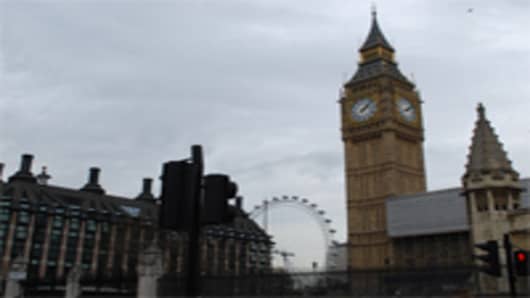David Cameron, the UK prime minister, celebrates 100 days in power Wednesday and could be forgiven for considering his ascent to the top job in Britain as something of a success.
Before the vote, Bank of England Governor Mervyn King was quoted as saying the election was one to lose given the economic headwinds facing the UK.
On Wednesday last week, King told lawmakers during the quarterly briefing on the Bank of England's inflation report that the UK will see better, if still modest, growth than previously thought, with inflation remaining lower over the next two years.
As Britain went to the polls in May, the Greek crisis was blowing up within the euro zone and the fear-mongering of Cameron and his party in opposition on runaway government spending looked completely justified to the market.
Three months after the election, the pound has rallied considerably and fears over the health of the UK public finances have taken a back seat to fears over a slowdown in the US and China.
The bond vigilantes currently appear to have bigger worries than the UK and growth in the second quarter was far better than forecast, giving the impression that Cameron and his team have that must valuable of commodities, luck.
Having not even won the election outright and been forced to form a coalition government with the more left-wing Liberal Democrats, Cameron is pushing on with plans for public spending cuts that those within his party will tell will be even more radical than those of Margaret Thatcher.
This spirit of austerity has been received well by the market but has put Cameron's government on a collision course with unions angry at the prospect of huge job losses across the public sector.
Austerity Looms
Recently, data from the housing market and retail sector has indicated that the prospect of austerity measures, due to kick in later this year, is making consumers nervous.
A report from RICS last week showed house prices beginning to edge lower, while a report by Findaproperty.com said housing stock levels have risen 6.5 percent since July and there are now 53 percent more properties on the market compared to January 2010.
Stephen Robertson, the head of the British Retail Consortium told CNBC that the prospect of austerity measures is beginning to worry his members and he expects difficult trading conditions this year and next for all but the biggest supermarkets.
The market had taken an overly optimistic view on the UK economy, which led to a surge in the pound against the dollar, but there has been a gradual easing in the sterling easing since the beginning of the month, Neil Mellor from Bank of New York Mellon said.
The big question for Cameron and the UK remains fiscal consolidation and the market and public's reaction to spending cuts.
The debate is still raging over whether to cut now or keep on spending and borrowing. The key exponent of theory that says spend now is David Blanchflower, a former member of the Bank of England's monetary policy committee who now teaches at Dartmouth College.
Not Much of a Clue?
"The problem in the UK is that this new government's come in and doesn't seem to have much of a clue about economics. It's made a set of announcements about what it was going to do but didn't really understand where the economy was," Blanchflower said.
"The problem is if it's slowing and you decide to cut fiscal policy like mad, you cut spending and raise taxes then really that puts huge strain on monetary policy," he added.
His words will clearly not be listened to by Cameron and his team, who from the outside at least are looking to attempt the most radical overhaul of the UK political system since Thatcher took on the unions in the early 1980s.
Thatcher was known as the milk snatcher by the British left after cutting free milk for school children when in power. In recent days, the idea was raised again forcing Cameron to come to the defense of free milk for kids to avoid being seen as Thatcher mark II.
He is attempting to be a radical reformer with a soft side, something that could be as difficult to pull off as getting Britain's economy through the next few years unscathed.
If he can get through the tough times, Cameron could enter the next election in five years able to lower taxes and win outright and thus begin building a legacy to match that of Thatcher.
If things go wrong, his party could find itself out of power for a generation. Again.
- Watch a round-up of the government's first 100 days above.





